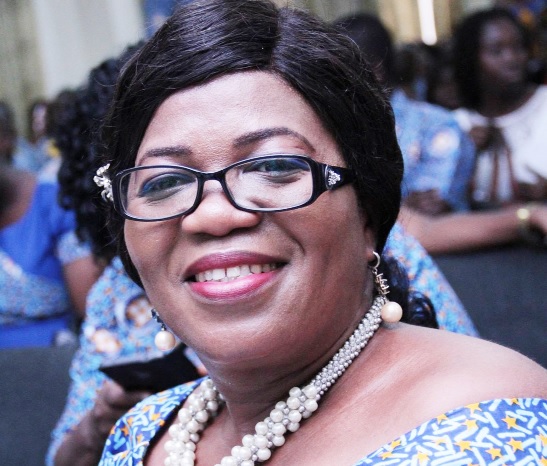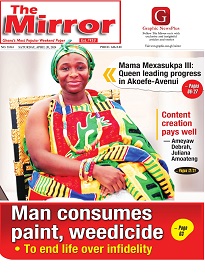The Mirror's Health , Lifestyle and Fashion

A walk through Department of Social Welfare
Since its establishment, the DSW has catered for hundreds of people who are deprived one way or another.
Advertisement
However, little is heard about the department and what they do or stand for.
Despite the many challenges, including the lack of adequate logistics, its officers encounter in the discharge of their duties, the department continues to help put smiles on the faces of the neglected in vocational institutions, hospitals, remand homes and rehabilitation centres where the department’s major mandate falls.
Works
The Mirror interacted with the Director of the department, Rev. Dr Mrs Comfort Asare, on the general operations of the DSW.
According to her, even though the department had done a lot over the years, people did not see much of their works and activities and, therefore, thought that they did nothing.
For instance, between 2018 and the first quarter of 2021, Dr Mrs Asare said the department had taken 195 children off the streets — 135 had been provided with skills training and 60 enrolled in schools.
According to her, it had provided character reformation and counselling services to 521 children who found themselves on the wrong side of the law, with 281 being catered for at two correctional centres and 240 supervised on probation.
Indeed, for the past three years, the department has handled 23,477 maintenance cases and families were counselled on their legal responsibilities.

The Department of Social Welfare provide welfare services to the Accra Psychiatric Hospital
Within the same period, it has taken over 760 missing and abused children and catered for them at the Shelter for Abused Children and later reunited them with their families, she added.
It had also catered for over 1,000 children and educated them through to the tertiary level while others were still in school.
“We have trained 711 foster parents and been able to place 236 children with foster parents who are monitored to provide quality care to the children. There are 10 Regional Foster Care Placement Committees in the 10 original regions as plans are underway to establish some for the new regions,” she said.
“We have also cared for 63 vulnerable aged persons at the Central Destitute Infirmary at Asante-Bekwai in the Ashanti Region, and monitored over 12, 000 day care centres. So far, we have registered 10,700 with 1,300 unregistered centres being processed for registration or closure. In fact, we are doing a lot for society,” she noted.
Brief background
The department was first established in 1946 by the Local Ordinance Order No. 66 as a Department of Social Welfare and Housing and later as the Department of Social Welfare in 1950.
Due to the decentralisation and the operationalisation of the Local Government Act (1993) (Act 462), Local Government Service Act 2003 and the Legislative Instrument (LI) 1961, all implementing functions and activities that were delivered to individuals and communities directly by the department were ceded to the Local Government Service and to the districts in 2011.
Currently, the department is a government statutory agency which falls under the Ministry of Gender, Children and Social Protection (MoGCSP).
Its works are guided by the 1992 Constitution of Ghana, Children’s Act 1998 (Act 560), Juvenile Justice Act 2003 (Act 653), Persons with Disability Act, 2006 (Act 715) among others.
The department has about 800 staff working at different units and divisions at the head office in Accra and in vocational institutions, hospitals, remand homes and rehabilitation centres across the country.
The various units and divisions under the department include the Standards, Research, Monitoring and Evaluation Division which is responsible for drafting policy guidelines and concept papers; and Child and Family Welfare Division responsible for designing child and family welfare programmes and activities.
The Programmes Development Division handles the development and piloting of strategic cross-sectoral programmes and projects on social welfare and development for poverty alleviation, while the Justice Administration Division provides the technical assistance and services that ensure the welfare of the vulnerable and marginalised groups.
The General Administration, Human Resource and Finance Division handles the effective running of the DSW, and the Training and Rehab Institutions develop curricula for all the institutions operating under the department.
Street children
When asked why children were still roaming the streets, Dr Mrs Asare said a lot of the work was under the Metropolitan, Municipal and District Assemblies (MMDAs) mandated by law to cater for children within their jurisdiction, “but people always think we are supposed to do all that even though we are doing our best with the little resources we have”.
“Section 16 of the Children’s Act 1998 (Act 560) makes MMDAs responsible for the protection of the children within their jurisdictions, but they don’t do it, and so we are always blamed for that, which should not be the case,” she said.
Notwithstanding, she said the MoGCSP was collaborating with stakeholders to find a lasting solution to the menace which would culminate in the development of a policy to tackle streetism in general.
Begging on streets
On street begging, Dr Mrs Asare called for the enforcement of the Beggars and Destitute Act, 1969 (NLCD 392) which criminalised the act of begging and giving to beggars.

The Department of Social Welfare has catered for and reintegrated many children into society
She said the police was mandated to arrest those who engaged in the act for prosecution in court after the department had submitted the necessary information to them.
She also indicated that it was wrong for people to parade children on the streets with different kinds of ailments or use boxes in traffic lights and ask the public to donate.
“There is the need for more sensitisation, media engagement and collaboration with the National Security and MMDAs on how to deal with these acts,” she added.
Closure of orphanages
Dr Mrs Asare told The Mirror that the DSW had begun processes of closing down some orphanages across the country.
Currently, she said the department had identified 37 homes out of the over 130 centres operating in different parts of the country and was in the process of closing down more in the coming months.
According to the director, children in most of the homes did not receive the needed care and attention, and that tended to affect their growth and development.
“We are also monitoring 136 private residential homes for children. Fourteen have been closed down in the past, but the target is to reduce the number to 50 residential homes.
“These children must be brought back to their homes for their parents or family members to cater for them properly. They need care, assistance and love. We should not push them out there to be abused by unscrupulous people. We should care for those with disabilities as well,” she emphasised.
Challenges
The director said many of the centres under the DSW were going through some challenges and needed support from the public.
She cited the Central Destitute Infirmary at Asante-Bekwai in the Ashanti Region which had over 20 infirmaries but worked with few resources, including lack of beds and the need to give a facelift to the centre.
Apart from logistical challenges which she said was having a negative impact on the work of the department, the director indicated that the staff needed capacity building to conform to modern standards.
She said she was, however, grateful to the United States Agency for International Development (USAID), United Nations Children’s Fund (UNICEF), Catholic Relief Services, Kaeme and all other stakeholders for their continuous support to the DSW.
Therefore, if you are a business entity or benevolent organisation and you want to help the less privileged, do channel your resources and support to the DSW to cater for the homeless, underprivileged and abused children in society.





